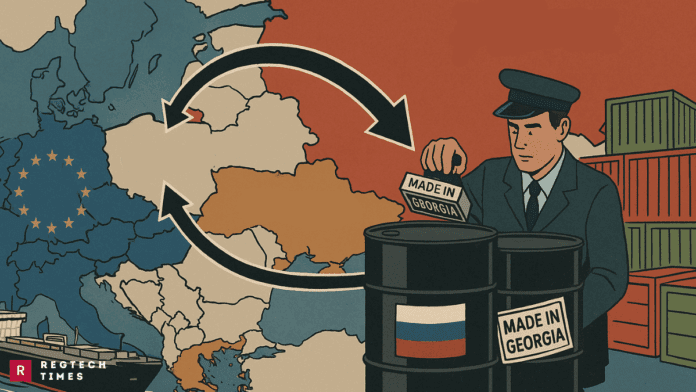Georgia, a small country in the Caucasus region, is suddenly exporting much more oil than ever before. This is surprising because Georgia doesn’t produce much oil itself. In fact, the country only produces around 35,000 to 40,000 tonnes of oil per year—just enough to meet a tiny fraction of its own needs.
But between 2022 and 2024, Georgia exported 275,000 tonnes of oil and petroleum products. That’s more than four times what it exported between 2019 and 2021. Even more concerning, 104,000 tonnes of this oil went to European Union (EU) countries. Experts believe this oil isn’t truly Georgian—it’s Russian oil with a new label.
Georgia has long been a transit point for goods going into Russia. Now, it seems to be doing the opposite—helping Russian oil go into Europe, even though that oil is supposed to be under sanctions.
Sanctions Dodge: Russian Oil Finds a Way In
In response to Russia’s full-scale invasion of Ukraine, the EU placed two major sanctions on Russian oil—one in December 2022 and another in February 2023. These were designed to limit Russia’s income from oil sales. But despite the strict rules, Russia is still finding ways to sell its oil to Europe.
Russia’s Dangerous Naval Base: A New Threat That Could Drag Georgia Into War
One of those ways appears to be through Georgia. The country imports a large amount of oil, and Russia is its biggest supplier. In 2021, Georgia imported 225,000 tonnes of oil from Russia. By 2023, that number jumped to 771,000 tonnes.
The problem is, Georgia doesn’t have any real oil refineries. It’s not processing this oil—it’s simply passing it along. This means the oil coming out of Georgia is likely the same Russian oil that came in, just with different paperwork.
Investigations show that some companies in Georgia are re-labeling Russian oil, registering it under Georgian names, or slightly mixing it with local materials to make it seem different. These tricks make it harder for buyers in Europe to tell where the oil really comes from. Because of this, Russian oil is slipping past the sanctions and reaching Western markets.
Hidden Risks and Global Reactions
The EU is not the only one affected. In 2023, countries that are part of the Russia sanctions still imported almost €8.5 billion worth of petroleum products made from Russian oil. These often came from countries like India, China, Turkey, and the UAE. But Georgia stands out because it does not refine the oil—it simply ships it through.
This kind of trade poses big risks. Experts warn that Georgia could face penalties if this continues. It may be labeled a “high-risk” country when it comes to obeying international rules. This could also affect its plans to become closer to the EU.
Germany and France Strike Back: Visa-Free Ban on Georgian Diplomats Amid Political Crisis
Meanwhile, the United States has also taken notice. US officials have talked about adding harsh tariffs—up to 500%—on goods from countries that continue to help Russia dodge oil sanctions. These so-called “bone crushing” tariffs are meant to punish countries that break the rules.
Other countries are involved in similar schemes. For example, more than 5 million tonnes of Russian oil went from Turkish ports to the EU between February 2023 and February 2024. Like Georgia, many of these ports don’t have refining facilities, meaning the oil was not changed before export.
This growing trend shows how some countries are becoming part of a hidden trade network. These countries act as middlemen, helping Russia get around sanctions without doing anything illegal on the surface.
